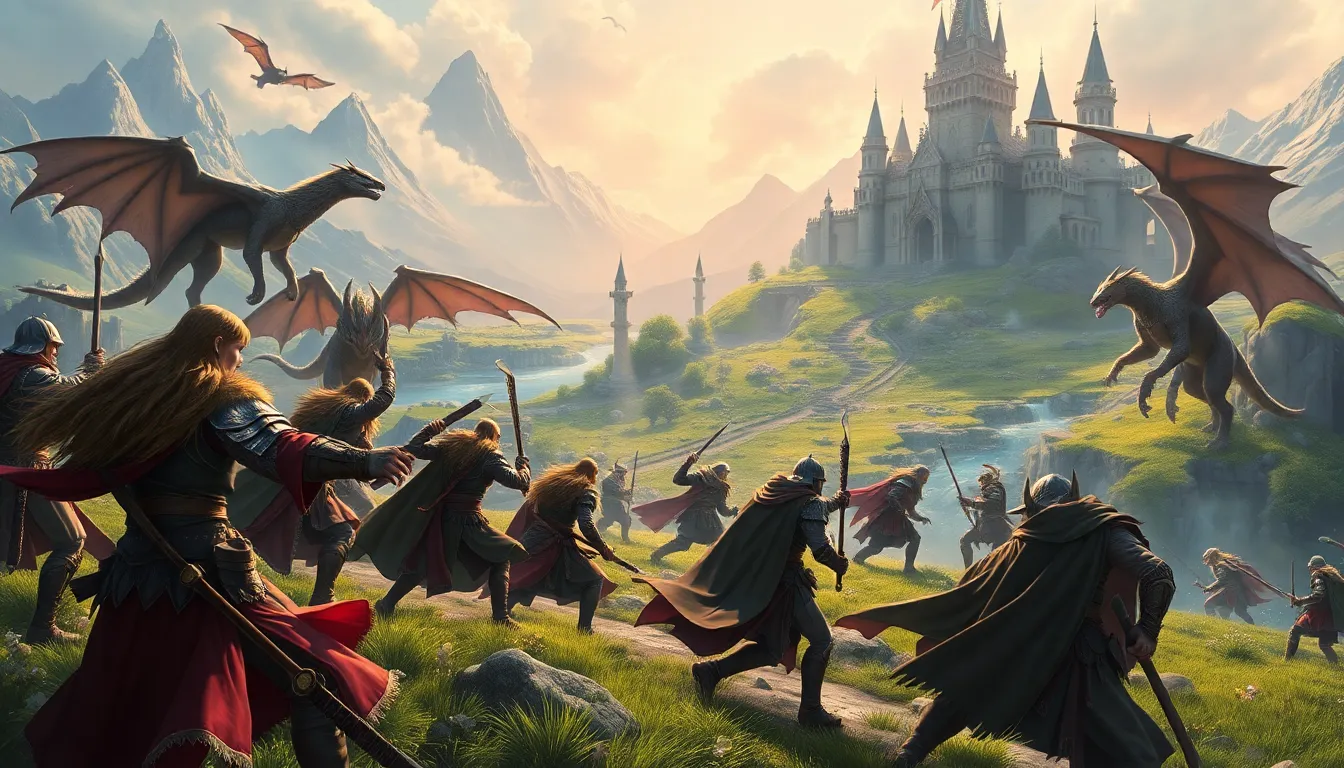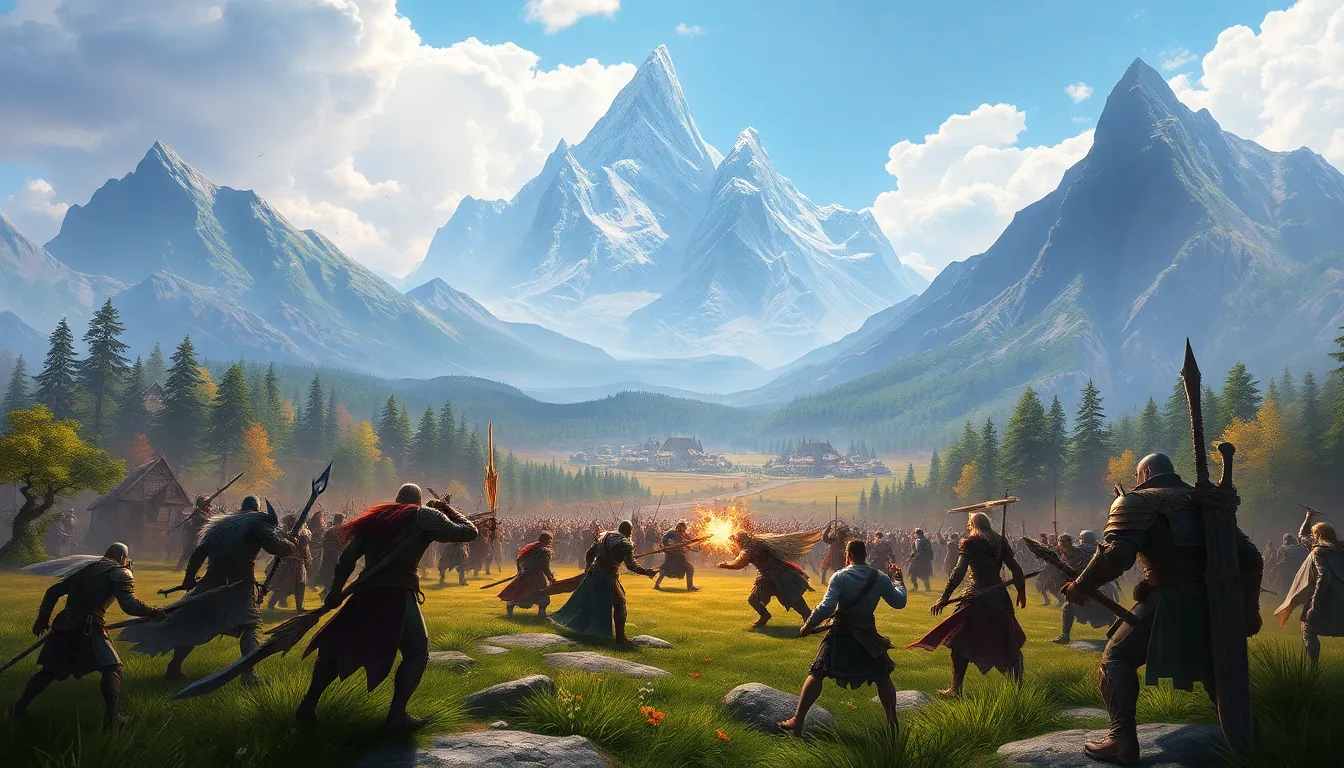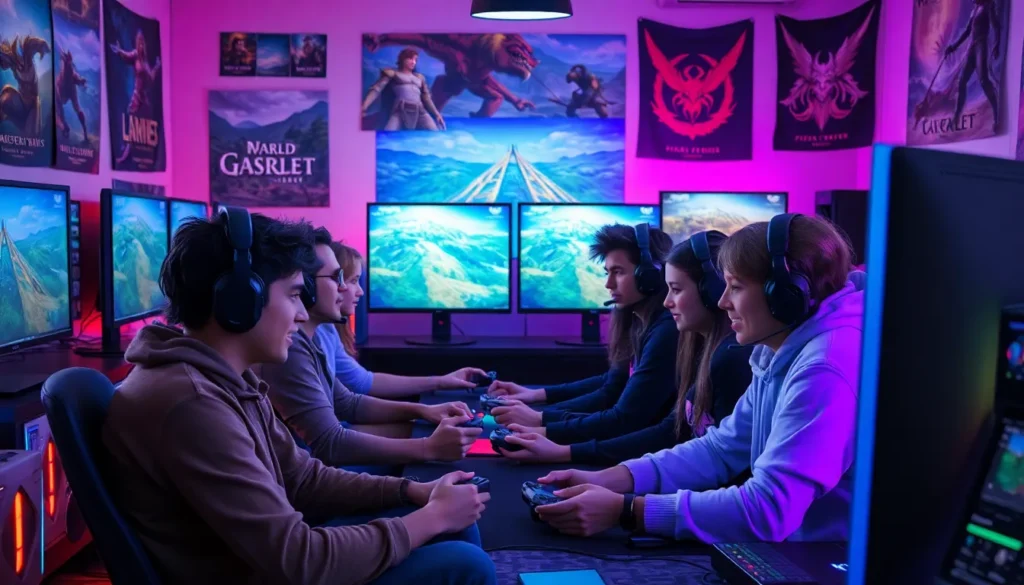Table of Contents
ToggleIn the vast landscape of online gaming, Massively Multiplayer Online Role-Playing Games (MMORPGs) stand out as a unique phenomenon. These immersive worlds invite players to embark on epic adventures, forge alliances, and engage in fierce battles, all while interacting with thousands of others in real time. The blend of storytelling and social interaction creates an experience unlike any other, drawing in gamers of all ages.
As technology advances, MMORPGs continue to evolve, offering richer graphics, deeper narratives, and more intricate gameplay mechanics. Players find themselves not just participating in a game but becoming part of a thriving virtual community. Whether exploring enchanted forests or battling formidable foes, the allure of online MMORPGs captivates millions, making them a staple in the gaming industry.
Overview of Online MMORPG
Online Massively Multiplayer Role-Playing Games (MMORPGs) represent a dynamic genre in the gaming industry. Players engage in vast, persistent worlds that accommodate thousands of participants simultaneously. These environments facilitate exploration, quest completion, and character development, allowing gamers to create personalized avatars.
Gameplay in MMORPGs typically includes a mix of PvE (Player vs. Environment) and PvP (Player vs. Player) elements. PvE content features quests, dungeons, and raids, designed to challenge group coordination and strategy. PvP allows players to compete against each other, enhancing the thrill of combat and rivalry.
Social interaction plays a critical role in MMORPGs. Players frequently form guilds or clans to collaborate on missions, share resources, and organize events. These communities serve as support networks, fostering friendships that transcend geographic boundaries.
Technological advances continuously shape MMORPGs. Enhanced graphics, realistic animations, and intricate storytelling elevate immersion. Moreover, updates and expansions provide fresh content, ensuring player engagement over time.
Statistics show that MMORPGs attract diverse demographics, with millions actively participating globally. This diverse player base contributes to vibrant in-game economies and rich cultural exchanges within gaming communities.
The future of MMORPGs promises further innovation, with augmented reality and virtual reality technologies on the horizon. This evolution will redefine player experiences, offering new avenues for engagement and exploration.
Popular Online MMORPGs


Numerous MMORPGs captivate players with their unique features and immersive worlds. Here’s a look at three popular titles dominating the genre.
Game 1: Overview and Features
World of Warcraft (WoW) stands as a pioneering MMORPG since its 2004 release. Players explore the vast, dynamic world of Azeroth, completing quests, battling foes, and joining guilds for collaborative raids. Key features include:
- Rich Lore: Extensive backstory enhances the player experience.
- Diverse Classes: Multiple character classes cater to varied play styles.
- Expansions: Regular expansions introduce new content, keeping the gameplay fresh.
- Active Community: A large player base fosters social interactions, trading, and alliances.
Game 2: Overview and Features
Final Fantasy XIV (FFXIV) has gained immense popularity since its relaunch in 2013. Set in the fantastical world of Eorzea, players engage in quests and dynamic events. Notable features include:
- Story-Driven Gameplay: Engaging narrative encourages player investment.
- Job System: Flexible job classes allow players to switch roles without creating new characters.
- Free Trials: Generous free trial options enable players to experience the game without commitment.
- Cross-Platform Play: Compatibility across platforms ensures a diverse gaming community.
Game 3: Overview and Features
Guild Wars 2 offers a unique twist on traditional MMORPG conventions with its focus on player-driven events. Launched in 2012, it provides an expansive, open world where players can engage in both PvE and PvP. Essential features include:
- Dynamic Events: Events change based on player actions, creating engaging gameplay experiences.
- No Subscription Fees: A one-time purchase model makes the game accessible without ongoing costs.
- Exploration Incentives: Rewarding exploration encourages players to discover the world and engage with its lore.
- World vs. World: A large-scale PvP feature fosters competitive gameplay across different servers.
These MMORPGs exemplify the genre’s appeal, combining deep stories, vibrant communities, and engaging gameplay mechanics.
Gameplay Mechanics in Online MMORPGs
Gameplay mechanics in online MMORPGs focus on character development and combat systems, offering players engaging experiences that enhance immersion and interaction. These elements define how players progress and interact within the virtual world.
Character Development
Character development in MMORPGs involves several interconnected systems that shape player experiences. Players customize their avatars through various options, including race, class, and appearance.
- Leveling System: Players earn experience points (XP) through quests and battles, enabling them to reach higher levels and unlock new abilities.
- Skill Trees: Skill trees allow players to specialize in different areas, enhancing specific attributes or unlocking unique skills that cater to individual playstyles.
- Gear and Equipment: Players acquire gear through loots or crafting, which improves their stats and provides visual customization options.
- Achievements and Milestones: Completing achievements rewards players with titles or rewards, fostering a sense of accomplishment and progression.
- Role-playing Elements: Role-playing aspects allow players to immerse themselves in the game’s narrative, fostering deeper connections to their characters.
Combat Systems
Combat systems in MMORPGs vary widely but share common features that contribute to their complexity and excitement.
- Real-time Combat: Many MMORPGs employ real-time combat mechanics, requiring players to react quickly and strategically to opponents.
- Ability Rotations: Players utilize a series of abilities in a specific order to maximize damage output or support teammates, promoting teamwork and strategy.
- Targeting Mechanics: Target-based systems enable players to select enemies through various methods, enhancing clarity during high-stakes combat.
- PvE and PvP Dynamics: PvE combat focuses on defeating AI-controlled enemies, while PvP combat introduces competition among players, presenting unique challenges and strategies.
- Crowd Control Effects: Abilities that immobilize or debuff enemies add layers of tactical depth to combat encounters, affecting team dynamics.
Together, character development and combat systems create rich gameplay experiences that define MMORPGs, fostering community engagement and interactions within expansive virtual worlds.
Social Aspects of Online MMORPGs
Social interaction represents a core component of online MMORPGs, fostering relationships that enhance gaming experiences. Players engage in community dynamics, forming lasting connections through collaborative gameplay.
Community Interaction
Community interaction thrives in MMORPGs as players communicate via chat systems, forums, and social media platforms. Real-time messaging enables instant sharing of strategies, experiences, and advice. Events hosted by developers or players further strengthen community bonds, encouraging participation in in-game challenges or quests. Communities often produce user-generated content, including videos and guides, enriching the collective knowledge and creativity of players.
Guilds and Teams
Guilds and teams play a vital role in MMORPG social structures. Players can join or create guilds to collaborate on quests, tackle challenging raids, and share resources. Guild membership enhances social interaction by providing a support network and fostering friendships among members. Competitive teams often engage in PvP tournaments, showcasing skill and teamwork while building camaraderie. The shared goals of guilds promote active participation and create memorable experiences that extend beyond the game itself.
The world of MMORPGs continues to thrive as a dynamic and engaging genre within online gaming. Their unique blend of immersive storytelling and social interaction keeps players captivated for hours. As technology advances, these games evolve to offer richer experiences that draw in diverse audiences.
The vibrant communities formed around MMORPGs foster connections that transcend geographic boundaries. Players collaborate in guilds and teams, creating lasting friendships and shared memories. With exciting gameplay mechanics and regular updates, the future of MMORPGs promises even more innovation.
As players explore new realms and challenges, the appeal of MMORPGs remains strong. This genre not only entertains but also builds communities that enhance the overall gaming experience.







